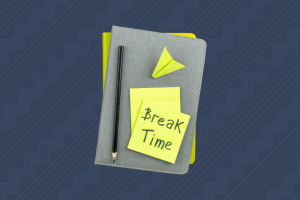One of the most effective ways to maintain focus and productivity is by taking breaks. While it may seem counterintuitive, taking regular breaks throughout the day can help individuals achieve more in less time.
By giving the brain a chance to rest and recharge, individuals can improve mental clarity, reduce stress, and increase overall productivity. In this article, we will explore the benefits of taking breaks and provide tips for incorporating this important habit into daily routines.
Why are breaks important?
When you are working or studying hard, your brain has to resist distractions to focus on the task at hand. Your prefrontal cortex is mostly responsible for this kind of “think-work” as it plays a major role in your ability to concentrate, think logically, and resist impulses.
This level of concentration gets harder by the minute as your brain expands energy! At some point, you will need to recharge to replenish after working so hard.
Also, taking breaks can help boost productivity in the long run. Here are some reasons why:
1. Reduces burnout:
Taking breaks can help prevent burnout, which occurs when you work too much and become mentally and physically exhausted. When you take breaks, you give your brain and body time to rest and recharge.
2. Increases focus:
Breaks can help increase your focus and concentration. When you take a break, you allow your brain to shift its focus away from work and onto something else. This can help you come back to your work with a fresh perspective and renewed energy.
3. Improves creativity:
Breaks can also help improve your creativity. When you take a break, you give your brain a chance to wander and think about other things. This can help spark new ideas and solutions to problems.
4. Boosts motivation:
Taking breaks can also help boost your motivation. When you take a break, you reward yourself for working hard. This can help you feel more motivated to continue working.
5. Improves performance
Taking breaks is linked to better performance at work—and you don’t have to step away from your to-do list for hours at a time to improve performance; all it takes is a few minutes.
6. Lowers stress
Research shows that breaks can help to reduce stress in the workplace—and the less stressed you are at work, the easier it is to get things done. So, by taking breaks throughout the day, you can better manage your stress—and deliver a boost to your productivity in the process.
How long should a break be?
It is recommended to take a break every 60-90 minutes of work or study. These breaks can be short, about 5-10 minutes, and should include activities that help to relax the mind and body, such as stretching, walking, or deep breathing.
Short breaks can help you stay motivated. It can also be helpful to reward yourself every once in a while, with a longer break. Many people find it helpful to use the Pomodoro technique, in which you work for twenty-five minutes and then take a five-minute break. After four twenty-five-minute work sessions, give yourself a longer, twenty- or thirty-minute break.
If you can’t find time to relax, try switching tasks (also known as interleaving)! Some studies have indicated that interleaving can provide some of the same benefits as taking a break. For example, if you’re becoming tired of studying biology, do something completely unrelated, like dishes, or study something else. Consider this a temporary solution until you can fit more time into your calendar.
Breaks ideas to boost productivity
Here are a few ways to make the most out of your break time:
-
Get up and move:
Physical activity can help boost energy levels and improve focus. Take a quick walk around the office or stretch at your desk.
-
Practice mindfulness:
Taking a few minutes to practice mindfulness or meditation can help reduce stress and improve mental clarity.
-
Have a healthy snack:
Eating a healthy snack, such as fresh fruit or nuts, can help improve energy levels and focus.
-
Connect with others:
Taking a break to connect with coworkers or friends can help improve mood and reduce stress.
-
Take a nap:
A short power nap can help improve alertness and productivity. Try taking a 20-minute nap during your lunch break.
-
Stay hydrated:
Drinking enough water throughout the day can help improve cognitive function and prevent fatigue.
-
Minimize distractions:
Try to minimize distractions such as social media or email notifications while working on important tasks.
In conclusion, taking breaks at work is crucial for maintaining productivity, creativity, and overall well-being. It can help to reduce stress, improve focus, enhance memory retention, increase social interaction, and boost physical health.
Employers should encourage their employees to take regular breaks and provide a comfortable and conducive environment for them to do so. By prioritizing breaks, individuals can achieve better work-life balance which ultimately leads to greater job satisfaction and career success.

